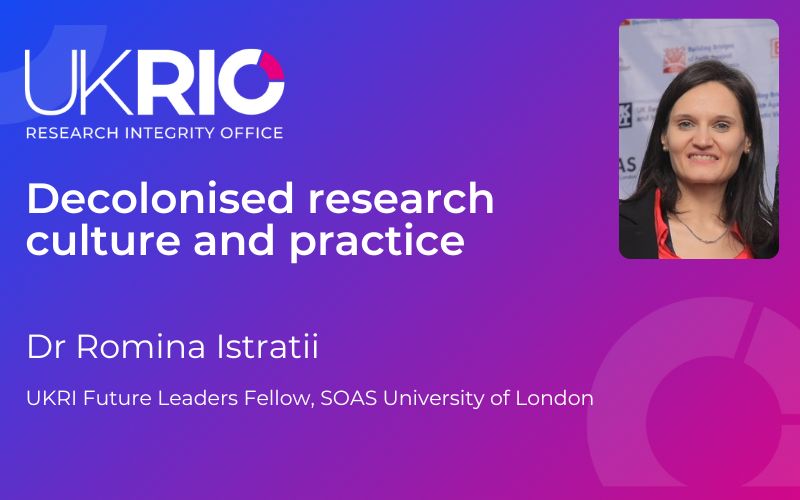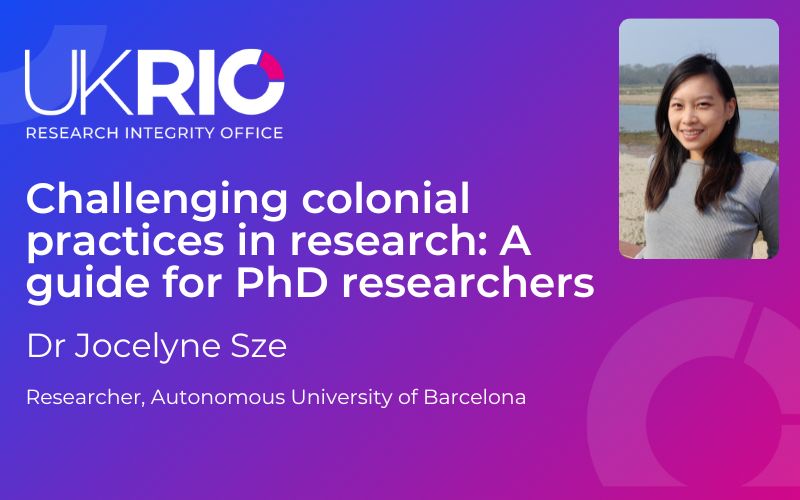Decolonised research culture and practice
Wednesday 17 April 2024 10:00-11:00 BST
University curricula across the UK are being reviewed to ensure they are inclusive and encompass knowledge systems outside of typical western understanding, and which have up to now not always been included.
To solve the urgent challenges which research is exploring, a diversity of people and ideas are needed, and too often organisations have played an unintended part in putting up barriers to inclusive research. Some are using their influence to remove those barriers.
A decolonising research methodology is an approach that is used to challenge research methods that may not take account of local knowledge and experiences of marginalised groups.
This webinar sought to extend the debate into research and research methodologies to ask how can a decolonised research culture improve research integrity and what are the ethical implications?
SPEAKERS
Decolonised research culture and practice: how can a decolonised research culture improve research integrity and what are the ethical implications Dr Romina Istratii, UKRI Future Leaders Fellow, SOAS University of London.
To watch Dr Romina Istratii’s video click here. To view the slides click here.

In this video, Romina provided an introduction on how decolonisation and decoloniality is relevant to research and what this has translated into within academic and impact-oriented research in recent years. She discussed the more structural and normative factors that have contributed to epistemological inequalities and the dominance of knowledge originating in Western high-income societies, including the role of funding structures, research development cultures and processes, research practices and research ethics and publishing standards. The main section of her presentation explored questions around research quality and research integrity from a decolonial lens and raise decolonisation-related questions to think about when research is collaborative, cross-culturally and takes place in diverse and uncertain environments.
Biography
Dr Romina Istratii (https://www.soas.ac.uk/about/romina-istratii) is a Lecturer and UKRI Future Leaders Fellow at the School of History, Religions and Philosophies at SOAS University of London. She is an interdisciplinary researcher, scholar and practitioner working across international development, gender studies, religion and theology, psychology and anthropology to address societal challenges with gender dimensions. She currently leads and manages a UKRI Future Leaders Fellowship of £1.2 million in Ethiopia and the UK that responds to domestic violence in religious communities working through an interdisciplinary, decolonial and innovative partnerships model with government, NGOs and grassroots groups. For the past 13 years, she has worked in development-oriented research to promote epistemological reflexivity, ethical research practices and healthy partnerships and collaboration models. She has led numerous initiatives within and beyond the university, having initialised the Decolonising Research Initiative: https://www.soas.ac.uk/research/research-vision-and-strategy/decolonising-research-initiative, under the aegis of the SOAS Research Directorate, co-founded Decolonial Subversions: http://decolonialsubversions.org/ in 2020 and set up project dldl/ድልድል in 2022. She previously served in the Advisory Board of the Future Leaders Fellows Development Network and as EDI officer for the UKRI Plus Fund project ‘The Future of Groups’.
Challenging colonial practices in research: A guide for PhD researchers Dr Jocelyne Sze, Researcher, Autonomous University of Barcelona.

Jocelyne shared her learnings on coloniality in research, drawing on her experience as someone trained in positivist natural sciences. She briefly covered, from her point of view, why as researchers working in academia we should challenge coloniality, going through the history of research’s complicity in colonialism and present legacies. She also shared some prompts on how to begin challenging coloniality in our own research, from our personal positionalities.
In this video, you will learn:
- Knowledge production is inherently political and creates power imbalances.
- Our identity, upbringing, and personal experiences have an effect on our work as researchers.
- Reflecting on our positionality and thinking through how and why we do research can help us start challenging the colonial norms of research and academia.
To watch Dr Jocelyne Sze’s video click here. To view the slides click here.
As an independent charity, UKRIO is apolitical and does not provide a platform for political views. In accordance with our standard policy, the recording of this webinar has been edited to remove political views expressed during the event. For more information about our policies and terms and conditions, please visit: https://ukrio.org/terms-and-conditions/.
Biography
Jocelyne (she/her) is a Singaporean Chinese trained as a natural scientist in conservation. During her PhD at the University of Sheffield (UK), she started exploring concepts of coloniality and decoloniality and the close ties between academia and colonialism. Alongside other PhD researchers, she developed a guide for other researchers (particularly coming from the natural sciences) to navigate these tensions. She works at the Autonomous University of Barcelona on Conservation Data Justice, looking at how geospatial data (maps) are used in conservation and its justice implications. She’s interested in Indigenous/non-dominant approaches to conservation, and creating a just future for all on this Earth. As an independent charity, UKRIO is apolitical and does not provide a platform for political views. In accordance with our standard policy, the recording of this webinar has been edited to remove political views expressed during the event. For more information about our policies and terms and conditions, please visit: https://ukrio.org/terms-and-conditions/.
